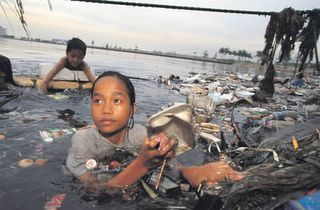
Kids floating in Manila Bay
A mid-term student evaluation from the CIU/IIIEE/VIDA/t42-developed distance education course: "Introduction to Sustainable Tourism", using the revealed some interesting aspects on what worked and what could be improved. The distance education course was presented in rural Costa Rica for a group of 14 Costa Rican and 14 Swedish youth and facilitated by 4 tutor using the problem-based learning method at a distance (PBLd). The purpose of the course was to help local entrepreneurs support a more sustainable tourism.
A mid-term student evaluation from the CIU/IIIEE/VIDA/t42-developed distance education course: "Introduction to Sustainable Tourism", using the revealed some interesting aspects on what worked and what could be improved. The distance education course was presented in rural Costa Rica for a group of 14 Costa Rican and 14 Swedish youth and facilitated by 4 tutor using the problem-based learning method at a distance (PBLd). The purpose of the course was to help local entrepreneurs support a more sustainable tourism.
What worked
- Contributed to increased awareness of sustainable tourism, and that there are problems in the host community that really needs to be addressed.
- Contributed to increased understanding of specific focus areas in the host community, such as hotels, pineapple industry or contamination of rivers.
- Provided a tool for autodidact learning to observe and explore several aspects in the local community, in addition to creating ideas for the community to develop themselves.
- Contributed to increased awareness in the local community of how to improve their own living environment, besides promoting what is already being done.
What can be improved
- Provide more examples on sustainable tourism more directly linked to activities in the host community, in addition to clues on what kind of sustainable tourism problems to work with.
- Explain more clearly that the very idea of PBL is to both define questions and find answers, which involves time-consuming detective work and independent thinking.
- Provide more help when introducing the web-based educational platform to the students and facilitators.
- Involve more external resource persons to help with contacts and content, in addition to work more extensively with solutions to identified problems in the project work.
Projects
The group as whole worked with the following projects in Costa Rica:
- Food farms (fishery and coffee plantation)
- Natural reserve (trekking, plant-a-tree, marketing)
- Pineapple industry (river contamination)
- Hotel industry (waste management)
Concluding comment
Reoccurring problems identified are time limits, language barriers, difficult course material, lack of tourism activities in the host communities and lack of support from resource persons. On the positive side is the well-cemented belief that sustainable development is a good thing and that the course has great potential to tackle this issue if the conditions are right, such as existing tourism activity in the host community.
References:
References:
- SanDiego State University - Problem-based learning
- CIU/IIIEE/VIDA/t42 - Introduction to Sustainable Tourism
No comments:
Post a Comment